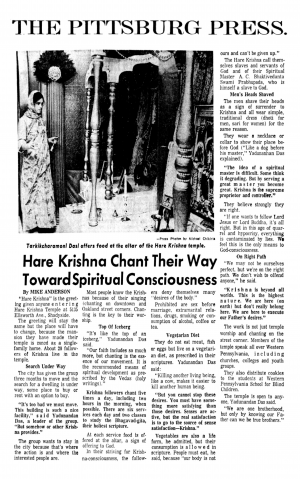Hare Krishna Chant Their Way Toward Spiritual Consciousness
This article, "Hare Krishna Chant Their Way Toward Spiritual Consciousness," was published in The Pittsburgh Press, February 17, 1973, in Pittsburgh, Pennsylvania.
By MIKE ANDERSON
"Hare Krishna" is the greeting given anyone entering Hare Krishna Temple at 5135 Ellsworth Ave., Shadyside.
The greeting will stay the same but the place will have to change, because the mansion they have made their temple is zoned as a single-family home. About 20 followers of Krishna live in the temple.
Search Under Way
The city has given the group three months to move and the search for a dwelling is under way, some place to buy or rent with an option to buy.
"It's too bad we must move. This building is such a nice facility," said Yadunandan Das, a leader of the group. "But somehow or other Krishna provides."
The group wants to stay in the city because that's where the action is and where the interested people are.
Most people know the Krishnas because of their singing, chanting on downtown and Oakland street corners. Chanting is the key to their worship.
Top Of Iceberg
"It's like the top of an iceberg," Yadunandan Das said.
"Our faith includes so much more, but chanting is the essence of our movement. It is the recommended means of spiritual development as prescribed by the Vedas (holy writings)."
Krishna followers chant five times a day, including two hours in the morning, when possible. There are six services each day and two classes to study the Bhagavad-gita, their holiest scripture.
At each service food is offered at the altar, a sign of offering to God.
In their striving for Krishna-consciousness, the followers deny themselves many "desires of the body."
Prohibited are sex before marriage, extramarital relations, drugs, smoking or consumption of alcohol, coffee or tea.
Vegetarian Diet
They do not eat meat, fish or eggs but live on a vegetarian diet, as prescribed in their scriptures. Yadunandan Das said:
"Killing another living being, like a cow, makes it easier to kill another human being."
"But you cannot stop these desires. You must have something more satisfying than those desires. Senses are active, but the real satisfaction is to go to the source of sense satisfaction - Krishna."
Vegetables are also a life form, he admitted, but their consumption is allowed in scripture. People must eat, he said, because "our body is not ours and can't be given up."
The Hare Krishna call themselves slaves and servants of God and of their Spiritual Master A. C. Bhaktivedanta Swami Prabhupada, who is himself a slave to God.
Men's Heads Shaved
The men shave their heads as a sign of surrender to Krishna and all wear simple, traditional dress (dhoti for men, sari for women) for the same reason.
They wear a necklace or collar to show their place before God ("Like a dog before his master," Yadunanhan Das explained).
"The idea of a spiritual master is difficult. Some think it degrading. But by serving a great master you become great. Krishna is the supreme proprietor and controller."
They believe strongly they are right.
"If one wants to follow Lord Jesus or Lord Buddha, it's all right. But in this age of quarrel and hypocrisy, everything is contaminated by lies. We feel this is the only means to God-consciousness."
On Right Path
"We may not be ourselves perfect, but we're on the right path. We don't wish to offend anyone," he said.
"Krishna is beyond all worlds. This is the highest nature. We are here (on earth) but don't really belong here. We are here to execute our Father's desires."
The work is not just temple worship and chanting on the street corner. Members of the temple speak all over Western Pennsylvania, including churches, colleges and youth groups.
They also distribute cookies to the students at Western Pennsylvania School for Blind Children.
The temple is open to anyone, Yadunandan Das said. "We are one brotherhood, but only by knowing our Father can we be true brothers."
Photo: Tarkikcharamoni Dasi offers food at the altar of the Hare Krishna temple.
